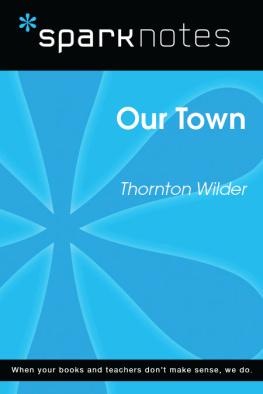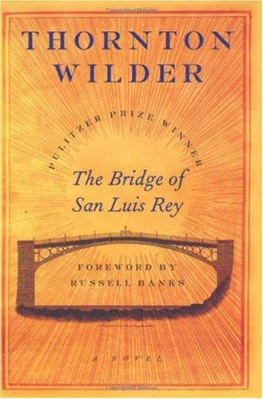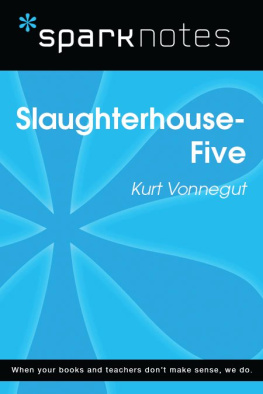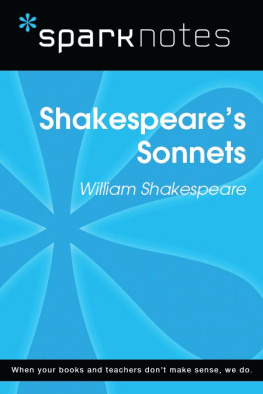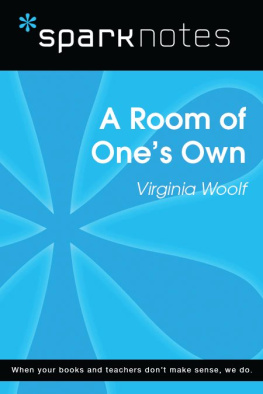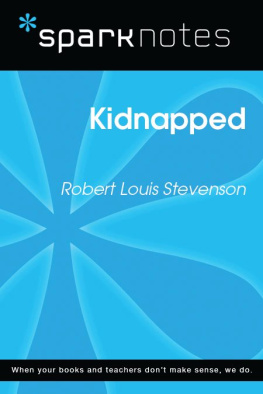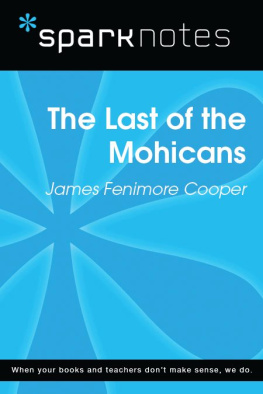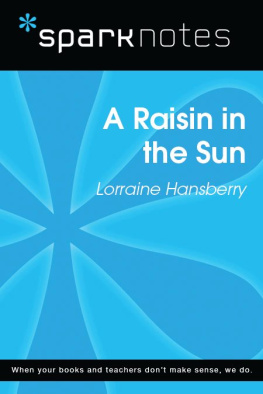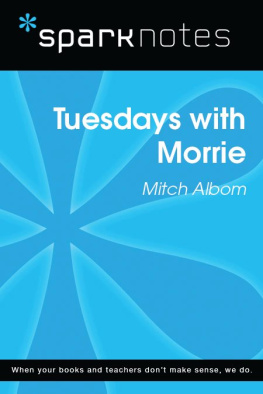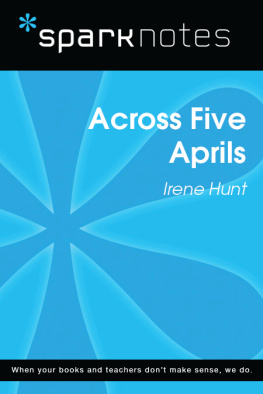Our Town
Thornton Wilder
2003, 2007 by Spark Publishing
This Spark Publishing edition 2014 by SparkNotes LLC, an Affiliate of Barnes & Noble
All rights reserved. No part of this publication may be reproduced, stored in a retrieval system, or transmitted in any form or by any means (including electronic, mechanical, photocopying, recording, or otherwise) without prior written permission from the publisher.
Sparknotes is a registered trademark of SparkNotes LLC
Spark Publishing
A Division of Barnes & Noble
120 Fifth Avenue
New York, NY 10011
www.sparknotes.com /
ISBN-13: 978-1-4114-7850-3
Please submit changes or report errors to www.sparknotes.com/errors.
10 9 8 7 6 5 4 3 2 1
Context
T hornton Wilder was born in Madison, Wisconsin, in 1897 . He attended Oberlin College in Ohio and then transferred to Yale University, graduating in 1920 . After spending a year in Rome, he took a job teaching French at a prep school in New Jersey and started writing on the side. Wilder published his first novel, The Cabala, in 1926 , but his first real taste of fame came when he was awarded the Pulitzer Prize for The Bridge of San Luis Rey ( 1927 ). The royalties from this novel allowed him to quit his teaching job, and he began to write full-time. Wilder quickly became a literary celebrity, keeping company with the likes of Ernest Hemingway, F. Scott Fitzgerald, and Gertrude Stein.
In the ideologically charged climate of the 1930 s, however, Wilder came under attack from critics who branded his work escapist fare that refused to confront the gloomy reality of the Depression. Hurt by this criticism and frustrated by the failure of his 1934 novel Heavens My Destination, Wilder turned to playwriting. Our Town, his most celebrated dramatic effort, opened on Broadway in 1938 to rave reviews. Audiences sensed the universality of the themes presented in the play, which enabled virtually every theatergoer to participate in the action onstage and identify with the characters. Our Town eventually won Wilder his second Pulitzer Prize, and went on to become one of the most performed American plays of the twentieth century.
In many ways, Our Town is Wilders response to his critics. Major works from other American writers of the timenotably Edgar Lee Masterss Spoon River Anthology and Sherwood Andersons Winesburg, Ohioexposed the buried secrets, hypocrisy, and oppression lurking beneath the surface of American small town life. In Our Town, however, Wilder presents a far more celebratory picture of a small town, the fictional hamlet of Grovers Corners, New Hampshire. Wilder does not deny the fact that the town suffers from social injustice and hypocrisy, and he does not intend to idealize Grovers Corners as a bastion of uncompromising brotherly love. On the contrary, Wilder makes a point to include in the play characters who criticize small town life, and Grovers Corners specifically. However, Wilder does not wish to denounce the community simply because it contains some strains of hypocrisy. Instead, he peers into Grovers Corners in order to find lessons about life in a world that contains both virtue and vice. He tenderly tracks the residents day-to-day activities, their triumphs and their sorrows, their casual conversations and their formal traditionsnot because he wants to praise New Hampshire, but because he wants to praise humanity. Perhaps a political message in itself, Our Town privileges the study of human life and its complexities over blatantly political works that point fingers, stereotype others, and otherwise divide people from one another.
Wilders principal message in Our Townthat people should appreciate the details and interactions of everyday life while they live thembecame critical at a time when political troubles were escalating in Europe. World War II was on the horizon when the play hit theaters in 1938 . It was a time of tremendous international tension, and citizens across the globe suffered from fear and uncertainty. Our Town directed attention away from these negative aspects of life in the late 1930 s and focused instead on the aspects of the human experience that make life precious. Wilder revealed his faith in the stability and constancy of life through his depiction and discussion of the small town of Grovers Corners, with its marrying... living and... dying.
The 1920 s and 1930 s proved to be the heyday of Wilders career. He enlisted as a soldier and served in Europe during World War II, and though he continued his literary career upon his return to the United States, his output decreased during the next two decades. A later effort to write a novel, The Eighth Day ( 1967 ), met with mixed reviews. Wilder died in December 1975 at his home in Connecticut.
Plot Overview
O ur Town is introduced and narrated by the Stage Manager, who welcomes the audience to the fictional town of Grovers Corners, New Hampshire, early on a May morning in 1901 . In the opening scene, the stage is largely empty, except for some tables and chairs that represent the homes of the Gibbs and Webb families, the setting of most of the action in Act I. The set remains sparse throughout the rest of the play.
After the Stage Managers introduction, the activities of a typical day begin. Howie Newsome, the milkman, and Joe Crowell, Jr., the paperboy, make their delivery rounds. Dr. Gibbs returns from delivering a set of twins at one of the homes in town. Mrs. Gibbs and Mrs. Webb make breakfast, send their children off to school, and meet in their gardens to gossip. The two women also discuss their modest ambitions, and Mrs. Gibbs reveals that she longs to visit Paris.
Throughout the play, the characters pantomime their activities and chores. When Howie makes his milk deliveries, for example, no horse appears onstage despite the fact that he frequently addresses his horse as Bessie. Howie does not actually hold anything in his hands, but he pantomimes carrying bottles of milk, and the sound of clinking milk bottles comes from offstage. This deliberate abandonment of props goes hand in hand with the minimal set.
The Stage Manager interrupts the action. He calls Professor Willard and then Mr. Webb out onto the stage to tell the audience some basic facts about Grovers Corners. Mr. Webb not only reports to the audience, but also takes questions from some audience members who are actually characters in the play seated in the audience.
Afternoon arrives, school lets out, and George Gibbs meets his neighbor Emily Webb outside the gate of her house. We see the first inkling of George and Emilys romantic affection for one another during this scene and during Emilys subsequent conversation with her mother. The Stage Manager thanks and dismisses Emily and Mrs. Webb, then launches into a discussion of a time capsule that will be placed in the foundation of a new bank building in town. He tells us that he wishes to put a copy of Our Town into this time capsule.
Now evening, a choir in the orchestra pit begins to sing Blessed Be the Tie That Binds. The choir, directed by the bitter yet comical choirmaster Simon Stimson, continues to sing as George and Emily talk to each other through their open windows. Mrs. Webb, Mrs. Gibbs, and their gossipy friend Mrs. Soames return home from choir practice and chat about the choirmasters alcoholism. The women return to their respective homes. George and his sister Rebecca sit at a window and look outside. Rebecca ponders the position of Grovers Corners within the vastness of the universe, which she believes is contained within the Mind of God. Night has fallen on Grovers Corners, and the first act comes to an end.

